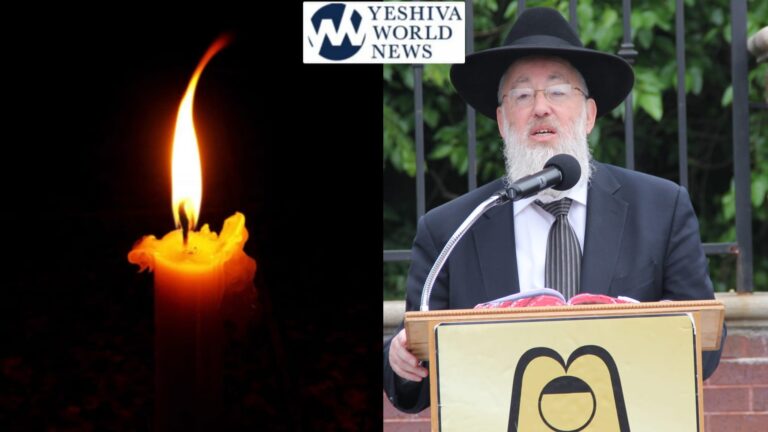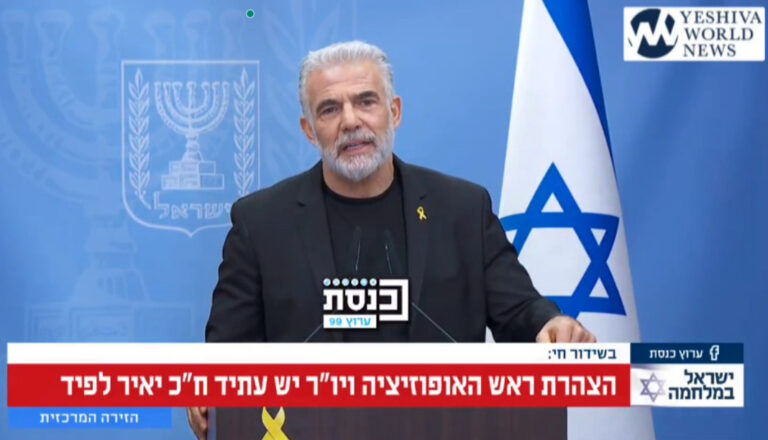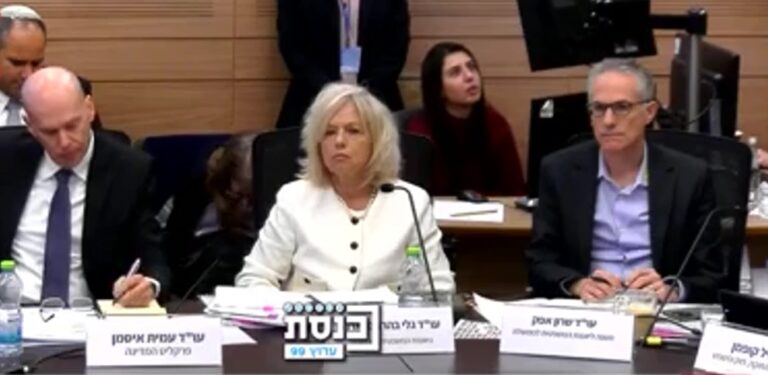
[PHOTOS IN EXTENDED ARTICLE]
Following a range of incredible sessions on Thursday evening, and an uplifting Shabbos for guests at the Agudath Israel of America 92nd national convention, the legendary Motzoei Shabbos keynote sessions attracted numerous participants – attendees who traveled from many communities in the region.
The beautiful music and singing by the Mezamrim choir greeted the guests as they arrived. Dozens of leading Roshei Yeshiva and Rabbanim took their seats at the dais in the Hilton Woodcliff Lake ballroom, along with the overflow crowd.
The speakers at the keynote session expounded upon the convention’s theme of “Shouldering the Responsibility”, with a particular emphasis on the self-sacrifice/mesiras nefesh mandated for Hashem’s chosen people.
Clarifying the Mission
The Motzoei Shabbos session was opened by convention chairman Duvy Gross, who stressed that every yid who devotes his or her time to the benefit of others is a de facto askan who merits the reward of “HaKadosh Baruch Hu yeshaleim secharam.” “Each and every one of you are genuine askanim,” Mr. Gross exclaimed.
The Novominsker Rebbe shlit”a, Rosh Agudas Yisroel of America, delivered a powerful address that included pointed sentiments about various pressing issues of the day. The Rebbe offered a special individual greeting to the plethora of young convention attendees who are eager to contribute to our community as well.
Towards the beginning of his remarks, the Rebbe stressed the blessings that our community sees each day: the renaissance blossoming of Torah and yiddishkeit in a cross section of America’s Orthodox communities and the growing love of chessed for a fellow yid.
At the same time, the Rebbe spoke passionately about the areas that need work: alleviating the shidduch crisis, fighting the “new plague of open Orthodoxy” and anonymous critics who deride talmidei chachamim.
Turning his attention to the situation in Eretz Yisroel, the Rebbe observed how klal Yisroel is suffering immensely at the hands of the Arabs as part of the chevlai moschiach. He related the antidote that is brought in the Gemara: intensifying our endeavors in Torah and gemilas chassadim. Particularly, the Rebbe implored American Jewry to help counter the draconian cuts that the Israeli government has imposed upon mosdos haTorah and bnei Torah.
“There should be no frum kehillah in this country that doesn’t adopt a Kollel in Eretz Yisroel,” the Rebbe exclaimed. “No one is absolved.” He added that a high level of chessed and generosity must be shown to suffering individuals from Eretz Yisroel who come to our communities to raise funds.
Other aspects of life in Eretz Yisroel that the Rebbe touched upon included his denunciation of “misguided” yidden who defy halacha and incite Arab violence by insisting on davening on the Har Habayis. The Rebbe then spoke of the greatness of Shmittah observance, and the work that the Keren Hashviis organization has done to raise observance to historic levels. “We are all bnei Eretz Yisroel, whether one was born there or is merely waiting to return,” the Rebbe stated.
Avraham Zylberstein, a farmer from Vered Yericho in Eretz Yisroel, then stepped up to the podium. He related his amazing journey towards keeping the mitzvos, including his fifth consecutive Shmittah. Mr. Zylberstein spoke of the miracles he has seen since undertaking mitzvah observance, including surviving severe cancer and seeing special beracha in his crops. The crowd was amazed when the Israeli farmer shared the status of his offspring: “Because of Keren Hashviis and you, I can support my sons who are learning in the yeshivos of Chevron, Solobodka and Mir!”
What does Agudah accomplish?
Most of governmental lobbying is done away from the public eye, and it’s often difficult for the public to connect the dots between the work of askanim and the benefits and freedoms we all enjoy on the ground. A special audio-visual presentation offered a glimpse into the list of activities and accomplishments that Agudath Israel of America and its askanim have been involved in within the past year alone.
They include a special mission to Washington, DC, focusing on the safety of Eretz Yisroel and global anti-semitism; school choice efforts and advocacy across the U.S., particularly the expansion of private school vouchers and scholarships in Florida and Ohio; prevention of autopsies in Maryland; alleviating the bureaucratic burden on parents of special-needs children in New York City; fighting government regulation of bris milah;and helping restore government educational services to nearly 30,000 frum children in Lakewood’s mosdos hachinuch.
Following the presentation, Rabbi Chaim Dovid Zwiebel, executive vice president of Agudath Israel of America, lauded various staff members of the organization and all others who have helped bring to “a year of tangible accomplishment in the world of shtadlanus.” Rabbi Zwiebel offered special thanks to Rabbi Labish Becker and Rabbi Yehiel Kalish for helping establish powerful Agudath Israel branches in nine states.
Rabbi Zwiebel particularly highlighted the successes that the organization’s Chayim Aruchim division has amassed by getting governments and hospitals to accommodate Jewish patients in end-of-life care. He quoted the words of Nancy Dubler, an ethics consultant for New York’s Health and Hospitals Corporation, who lamented Agudath Israel of America’s political clout in this area as “an 800 pound gorilla that sits where it wants to.”
Rabbi Zwiebel smiled as he compared that statement to that made by secular Jewish activist Dr. Joseph Tenenbaum in 1942, lamenting Agudath Israel of America’s work to send food packages to Nazi-occupied countries during the Holocaust: “In 1942, we were not welcomed because we were a ‘sickly weed’; in 2014, we aren’t welcomed because we’re an ‘800 pound gorilla’!…”
Complicating effective advocacy work on behalf of Orthodox Jewry, said Rabbi Zwiebel, is “the elephant in the room” of various scandals alleged against members of our community that hit the headlines, which tarnish our upstanding image in the eyes of those of whom we seek favor. “Keeping Torah and mitzvos cannot be external…it has to make you a better person,” said Rabbi Zwiebel.
Overcoming Nisyonos
No doubt, in our generation we are faced with uniquely difficult nisyonos in order to maintain our piety and avoid sinful pitfalls.
Rav Avrohom Schorr, shlit”a, Rav of Khal Tiferes Yaakov, delivered impassioned remarks regarding our obligation for mesiras nefesh in order to make a kiddush Hashem and avoid sin. The Rambam states that this is manifested when one avoids an aveira for no reason other than to fulfill Hashem’s will, just as Yosef Hatzaddik did during his moment of great nisayon.
The fundamental challenge these days, says Rav Schorr, is society’s insistence on “instant gratification,” which often prevents people from investing the long term work necessary to grow spiritually, save their marriage, and the like. Similarly, contemporary society’s prioritization of fulfilling individuals’ desires over what is right-and-wrong can be highly detrimental. “The ‘self-sacrifice’ we need is to sacrifice the ‘self’…the ‘I’ and the ‘me,'” Rav Schorr exclaimed.
While the sacrifice to maintain a high standard of tzniyus and kedusha in our communities is significant, Rav Schorr pointed out that going against the grain of these societal trends entails a far smaller sacrifice than the mesiras nefesh expected of our ancestors during the Holocaust, or even bnei Torah in Eretz Yisroel today who wonder where they’ll get hold of bread to feed their children. Rav Schorr stressed that the nisayon of technology – where one can sin without anyone else knowing – offers one the opportunity to fulfill the Rambam’s dictum of avoiding sin exclusively to fulfill Hashem’s will.
“It’s impossible not to see in this Rambam (a reference to) the nisayonos of our generation,” said Rav Schorr. He added that this concept similarly applies to those who perform mitzvos even when they don’t feel a geshmak in it.
The Strength of our Nation
With the array of practical and spiritual challenges we face, it is often difficult to muster the confidence that we can overcome it all.
The Motzoei Shabbos keynote session culminated with a fascinating firsthand account of a lone Jew whose faith and perseverance beat a ruthless global superpower. Rabbi Yosef Mendelevich, director of the Od Avinu Chai Foundation and R”M in Yeshiva Machon Meir of Yerushalayim, recounted his 11 years in Soviet prisons and his fight to free Soviet Jewry from the Iron Curtain.
Rabbi Mendelevich related in vivid detail the beatings, interrogation, solitary confinement, slave labor, death threats and other consequences he endured in order to keep Shabbos and kosher, daven and learn Torah, and even just wear a yarmulke (made from a patch off his pants). The mesiras nefesh displayed by Rabbi Mendelevich and other heroic Russian Jews who refused to bow to the Soviet regime was rewarded as the Russian Jewry was gradually let out from behind the Iron Curtain even before the communist regime’s eventual collapse.
While leading Rabbi Mendelevich on his trip out of prison – to the airport to go to Eretz Yisroel – a burly Russian colonel remarked, “I could never have believed that you Jews have such a strong will.” Rabbi Mendelevich concluded with the lesson we can all draw from his ordeal: “If you want to be a hero…do the ratzon Hashem.”
Following the keynote session, attendees joined in a festive Melave Malka, interacting warmly and discussing all the food for thought that was served in the previous hours. Live music, dancing, and the voices of the Mezamrim choir, enhanced the spirit of achdus and simcha that was the hallmark of the convention.












































































(Shimmy Blum – YWN)












13 Responses
Beautiful
‘alleviating the shidduch crisis, fighting the “new plague of open Orthodoxy” and anonymous’ blogging critics who deride talmidei chachamim.
Wonderful
Is it all 5-10 years late?
I have a simple solution to the shidduch crisis.
B’ezrat Hashem.
If the young girls getting into shidduchim will not listen to shidduchim of older boys being redt to them.
But will insist on dating only Bochrim close to their own age.
The older Bochrim will have no choice but to do likewise and with mesiras nefesh the shidduch crisis will be solved.
teshuva is never too late.
Yehi Baruch the farmers of EY
Yehi Baruch the prisoner of Zion, Reb Y Mendelovitch
ARAB terror, killings, attacks, are based on Koran, ARAB incitement & religious teachings. There is no way to incite/inflame or encourage those who are taught, modeled & rewarded for KILLING JEWS.
ז”ל בספרו משנת רבי אהרן: חשיבות הכינוס וזעקת המחאה אינם רק בבחינת התועלת שבדבר והתוצאות שיהיו לכך וכו’,שזהו הביטוי לכאב על הזלזול בכבודו של מלך וכו, ולכן גם אם לא יושג שום שינוי אצל הגורמים שהביאו לכך, הרי התועלת מכך היא כפולה וכו’ שע”י המחאה על הזלזול בתורה והרס הדת, וההכרזה שדבר זה בנפשנו הוא,בודאי יתעוררו רחמי שמים למעלה ויעצר הסחף בשמירת התורה ומצוותיה בכל התחומים. וכו’ ואלו המתנגדים למחאות הרי שתיקתם כהודאה גמורה!
“…the Rebbe implored American Jewry to help counter the draconian cuts that the Israeli government has imposed upon mosdos haTorah and bnei Torah.
“There should be no frum kehillah in this country that doesn’t adopt a Kollel in Eretz Yisroel,” the Rebbe exclaimed. “No one is absolved.”
Of course we cannot disagree. I will adopt a kollel in Eretz Yisroel and daven for them that they should all obtain a respectable parnassah, either from their limudim or otherwise. And I will also learn for their zechus.
In summarizing the words of the Novominsker Rebbe Shlita, YWN spends only 6 words on one of the Rebbe’s main themes. The bizayon HaTorah spread by blogs summarized in only 6 words? At first it didn’t make sense. Then it became obvious. One of the primary locations for …… COMMENT DELETED
Editors Note: Sorry to burst you bubble, but this was written by the Agudah and submitted to YWN. They are the ones who chose how many words to dedicate to what the Novaminsker Rebbe said.
The Rebbe was talking to people like you too. Think about it.
Rabbi Chaim Dovid Zwiebel, why not condemn the men who commit fraud and sim0ply say it is wrong and against halacha. and do not do it because it causes us problems
Instead of wicked leitzonus ,maybe teach rich israelis how to give tzeddakah
#7 M
Instead ,maybe teach rich israelis how to give tzeddakah
BH there are Rich Israelis and there are Charedi rich Israelis too!!
Rich Israelis give tzeddakah and there are numerous places where they give their funds. Yeshivos, yishuvim, mosdos, hospitals, Gmachs, Soup Kitchens, Terror victims, etc….
To #11, it’s one thing to give tzedakkah to people who work hard and are still broke — it’s something else to give to people who aren’t even trying. Nicha, if wealthy people want to participate in a yisachar/zevulun parternship, totally wonderful. But you’re trying to guilt people to give tzedakah to large communities that do little to obtain the education and training necessary to obtain respectable jobs. We’re talking about a community that thumbs its noses at education and training necessary for obtaining normal jobs.
So ya, I guess you can tell some rich Israelis, or Americans, or whoever, that they need to learn to give tzedakah. But I don’t think you will find their sympathies for this self-inflicted poverty. It’s a terrible, terrible situation that leaves so many terribly destitute families. A real shanda.